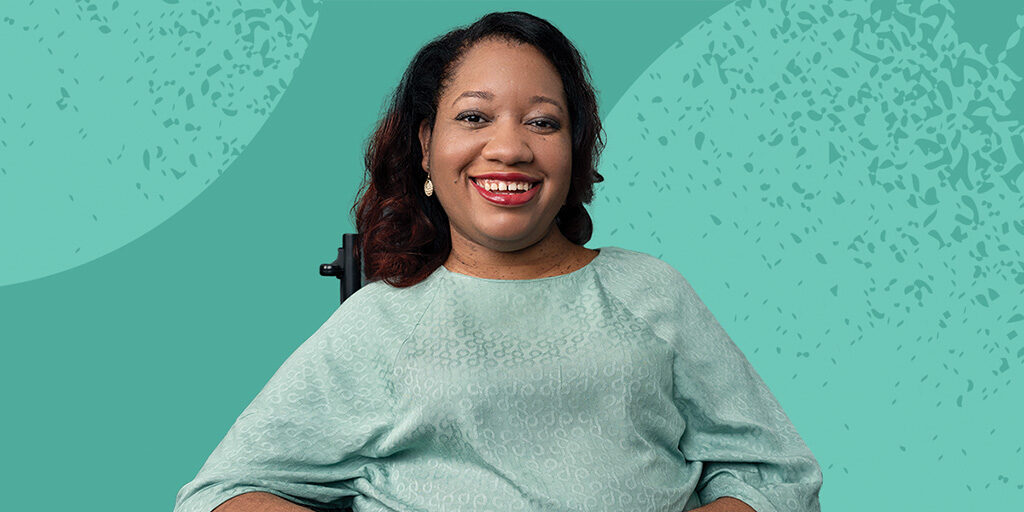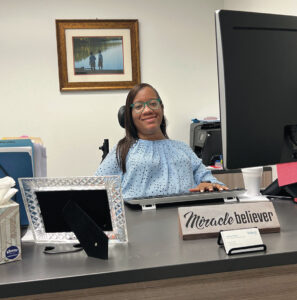
How an HR Professional with SMA Powered Her Career
By Rebecca Hume | Thursday, May 18, 2023
5 Second Summary
Quest for Success explores the different paths that individuals with neuromuscular disease have taken to reach their potential and pursue dreams. This series spotlights individuals from our community and shares their journey to independence and accomplishment.
Editor’s note: Leticia Tatum passed away in November of 2023. Leticia graciously shared with Quest her story of pursuing her educational and professional goals, the lessons she learned along the way, and her beautiful outlook on life. Individuals like Leticia and the families who love them are at the heart of everything we do and why MDA is committed to transforming the lives of patients with muscular dystrophy, ALS, and other neuromuscular diseases. In this article of Quest for Success, we honor Leticia’s memory, spirit, and passion for life.
Leticia Tatum, 42, knows first-hand that many different roads can lead to success. Living with spinal muscular atrophy (SMA), Leticia forged her own path to become Vice President of Human

Leticia and her husband, Douglas, enjoy traveling.
Resources (HR) at Valent Group, a risk consulting firm. She hopes her story will remind others that they are entitled to pursue their own quests for success.
“You’re not just allowed to want more, but you are deserving of it,” she says.
Developing confidence
Leticia was diagnosed with SMA when she was almost 2 years old. She is the oldest of four siblings and the only one in her family who lives with a physical disability. Her parents expected all their children to go to college and pursue careers. They instilled in Leticia the idea that she could and would do everything she wanted to do.
Leticia was raised in Birmingham, Alabama. Throughout her early education, her mother fought for Leticia’s right to be in mainstream classrooms instead of automatically assigned to special education, as was the custom for students with disabilities at the time.
Leticia used a wheelchair throughout her childhood and traveled to middle and high schools outside her district to be in accessible buildings. The school district provided an attendant to assist her with transfers in the bathroom. Leticia was active in her school community, joining the choir and school newspaper.
“I never felt I was treated any differently, which is so important,” Leticia says. “I had influential teachers who reminded me that there was no difference between me and the student sitting next to me who was able to walk.”
Transitioning to independence
After high school, Leticia enrolled at the University of Alabama at Birmingham. She commuted to campus and used the school’s Disability Support Services to navigate her accessibility needs. For example, when a classroom location was a barrier, she requested to move the class to an accessible building. She also received extended time on exams.

Leticia and Douglas enjoy time at the beach.
Transitioning to becoming an independent adult came naturally because Leticia’s parents helped her develop the tools she needed to live independently. “My parents were very hands-off, in a good way,” she says. “I could ask for advice, but if I needed something, they directed me to pursue resources myself instead of doing it for me. This put me in a position to advocate for myself and navigate my own path.”
This path changed direction a few times as she sought her passion. “I didn’t have all the answers, but I learned that it’s OK to figure it out as you go along,” Leticia says. “I think a lot of individuals in the neuromuscular disease community have to be planners. Pursuing an education and career takes some planning, but you don’t always have to have the answers. And the answers can change, and that is fine.”
Beginning a career
When Leticia began applying for entry-level positions after college, she didn’t disclose her disability before job interviews for two reasons: “One, my disability is physical, and I can’t hide it, so once I was there, it was evident to employers,” she says. “And two, no individual should feel that they have to reveal a disability. Employers should be looking at qualifications. So, I went to interviews with the intent that knowing I met the qualifications and believing I could do the job, the rest we would figure out.”
Leticia didn’t drive at the time, so she scheduled rides through the Birmingham-Jefferson County Transit Authority (BJCTA), calling so often that the scheduler eventually asked her where she was traveling so frequently. When Leticia shared that she was going to job interviews, the scheduler told her that the transit authority had an administrative assistant opening and promptly scheduled her a ride to apply. The executive director met with her and offered her the job that week.
Leticia’s boss at BJCTA recognized her potential and upgraded her title to HR Assistant. This small change helped launch her career in HR.
Advocacy and accommodations
Throughout her career, Leticia has had a variety of accessibility accommodations. Her employers have modified doors for easier opening and installed automatic doors and motion-activated lights. Employees typically make accommodation requests through their company’s HR department, but because she works on the HR team, Leticia meets directly with the company president to

Leticia’s employer provides accommodations in the office.
advocate for her needs.
Valent Group offers a hybrid work environment. Leticia lives in Birmingham with her husband, and he assists with transfers and toileting when she works from home. On days in the office, a caregiver accompanies her for half an hour to help prepare her lunch and assist in the restroom. Leticia worked with a vocational rehabilitation counselor to coordinate funding for an accessible van, so she can drive to work.
As her career progressed, Leticia surpassed the income threshold to obtain state-funded caregiver services. Determined to pursue high-level positions and receive the services she needed, she appealed the decision. She argued that if she was denied services, she could not remain a productive member of society, outlining how that would financially impact her ability to meet basic needs and live independently. The power of self-advocacy was evident, as the state granted her appeal.
“It is so important to advocate for yourself, as an individual with a disability and an individual working through a career, and to remember, ‘I belong here,’” Leticia says. “I focus on my ability and what I bring to the table. My disability is an important part of me, but it is not at the forefront. It takes a backseat to my strengths. I am not Leticia who has a disability and works in HR. I am Leticia, the HR leader, who happens to have a disability.”
Rebecca Hume is Senior Specialist and Writer for Quest Media.
Next Steps and Useful Resources
- Read more personal stories about people living and thriving with neuromuscular diseases.
- Listen to a Quest Podcast with motivational speaker Jose Flores discussing using the power of your mind to overcome obstacles.
- Stay up-to-date on Quest content! Subscribe to Quest Magazine and Newsletter.
TAGS: Career Quest, College, Employment, Quest for Success
TYPE: Featured Article
Disclaimer: No content on this site should ever be used as a substitute for direct medical advice from your doctor or other qualified clinician.




